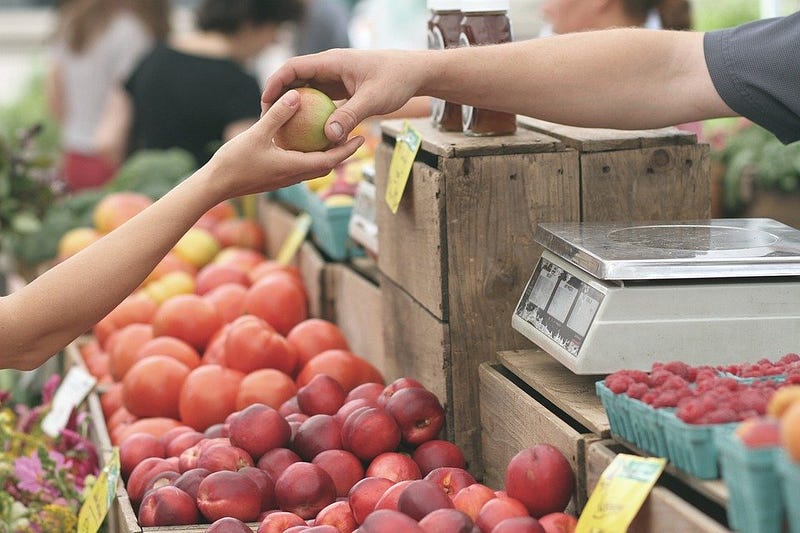Think Before You Shop: The Case for Buying Local
By Lucas Principe, Environmental Science and Philosophy, 2020

This article was originally published as part of Issue 36: Local.
Buying local means something different everywhere. What is local to us here in Boston means something completely different to someone in a small town like Atchinson, Kansas. This is mainly because “local” is a combination of both the geographic proximity to products as well as the relationship between producer and consumer. More importantly, buying local doesn’t have to apply solely to food. Any kind of product which can be made and sold within a community or its surrounding area constitutes a local product. However, what all local goods have in common across state lines is their proximity to the consumer and the human interactions that represent the transaction. These aspects result in a surge in the local economy and an incredibly sustainable and healthy way of living.
One important aspect of buying local is the economic effect on the community. Picture this: you buy a pair of shoes from a large retailer. While a portion of the money you spend on the shoes goes to the employees of the store in the form of a wage, another significant portion of these profits goes to the company itself, headquartered elsewhere, which means the money is taken out of the local economy. However, if you were to buy that same pair of shoes at a local shoe maker’s store, the profits would be going solely to the individual that made those shoes, who would then keep much of that money in circulation in the local economy.
As the local trend has grown over the past few decades, multiple studies have confirmed this economic effect. For instance, a 2011 study conducted by researchers at the Maine Center for Economic Policy (MECEP) concluded that every $100 spent at locally owned businesses in Portland generates $58 in local impact. In comparison, when that same $100 was spent at a representative national chain store, only $33 was generated in local impact. In short, MECEP found that shopping at local businesses as opposed to national chains generates up to a 76% greater return for the local economy.
In short, MECEP found that shopping at local businesses as opposed to national chains generates up to a 76% greater return for the local economy.
Additionally, local start-ups stimulate net job growth. According to a 2015 study done by researchers at the Kauffman Foundation, “new businesses account for nearly all new net job creation and almost 20 percent of gross job creation,” a huge boost to the economy. Moreover, over the past three decades start-ups less than one year old have generated an average of 1.5 million new jobs per year.
Buying local can also have many dietary benefits. Local produce is typically preservative-free, at peak ripeness, and is less likely to be contaminated due to the limited number of “hands” touching it from farm to table. Furthermore, if you are the type of consumer who likes to know where your food is coming from and how it is being harvested, all you have to do is ask the vendor at the farmers market where you shop. There is no massive, impersonal middleman, and typically these people are quite proud of their methods and are willing to share them with you.
However, the single biggest impact of buying local produce is the reduced carbon cost associated with transportation. Whenever you buy a non-local, in-season product, that product had to travel a certain distance to reach you. This transportation cost may not always be reflected in terms of the price of the product, but it will cost you and everyone else in the amount of carbon released into the atmosphere. According to research done by the Worldwatch Institute in 2002, food typically travels between 2,500 and 4,000 kilometers from farm to plate. By buying in-season, local produce, you can reduce your food footprint by 7–11%.
By buying in-season, local produce, you can reduce your food footprint by 7–11%.
Buying local can help keep money and create jobs in the local economy, ensure that food is at its peak freshness with a low chance of contamination, and reduce the amount of carbon released into the atmosphere from transportation. So, the next time you think about doing some shopping, think about where your products are coming from. Buy local and you’ll be contributing in the push towards a more sustainable society.
